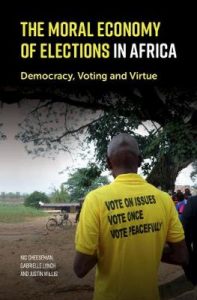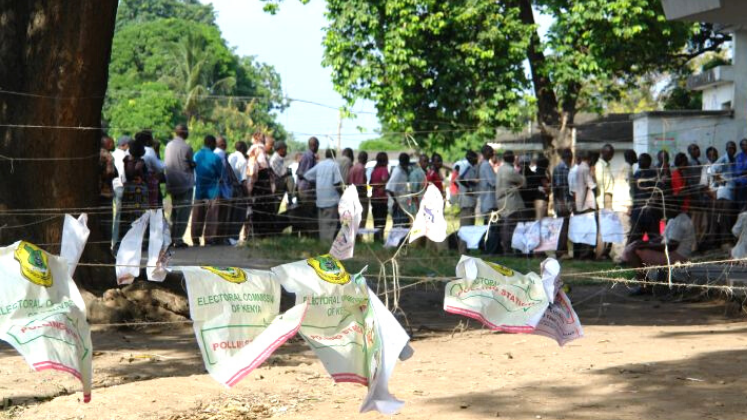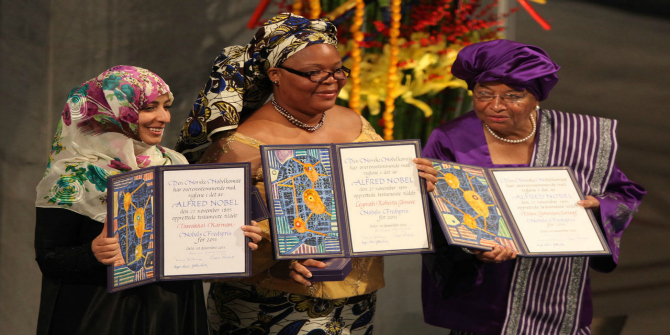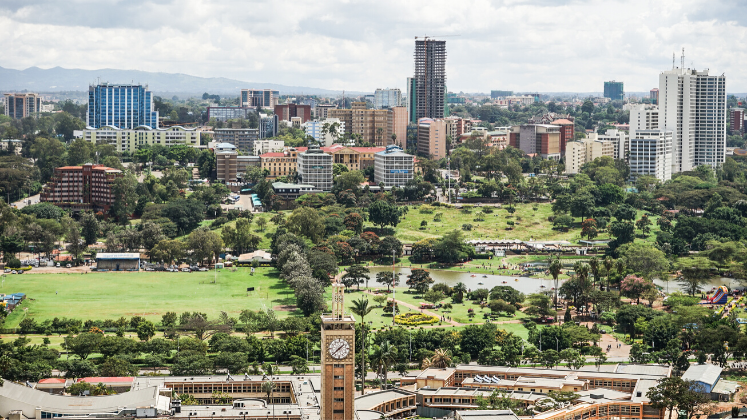In The Moral Economy of Elections in Africa: Democracy, Voting and Virtue, Nic Cheeseman, Gabrielle Lynch and Justin Willis explore moral claim-making in elections in Africa, focusing on the electoral history and experiences of Ghana, Uganda and Kenya. This book offers a new way of thinking about election studies in Africa and will guide researchers in understanding the complexities of political subjectivities and how claims of virtue shape political behaviour, finds Sewordor Toklo.
The Moral Economy of Elections in Africa: Democracy, Voting and Virtue. Nic Cheeseman, Gabrielle Lynch and Justin Willis. Cambridge University Press. 2020.
 Find this book (affiliate link):
Find this book (affiliate link): ![]()
For their new study, The Moral Economy of Elections in Africa, Nic Cheeseman, Gabrielle Lynch and Justin Willis, scholars at the Universities of Birmingham, Warwick and Durham respectively, conducted research between the period of 2014 and 2017 in Ghana, Uganda and Kenya. The book discusses moral claim-making during elections in Africa and suggests a new way of studying African elections.
The book focuses on politicians and electorates that make claims, and how voters respond to electoral manipulations. Elections are expected to be an avenue for voters and politicians to justify themselves to make a demand. As a result, both politicians and electorates are interested in talking about what is good and right so that other people can see them as moral actors behaving correctly.
The first chapter of the book provides a conceptual framework for the moral narratives that became the theoretical basis for the research. The second chapter analyses the electoral history of Ghana, Uganda and Kenya, where Ghana is generally identified as a successful democratic country in Africa. Chapter Three provides an overview of electoral management, where all three countries are seen to have similar cultural and institutional frameworks. The fourth chapter focuses on how international election observation influences electoral credibility. It also highlights the roles and challenges for domestic observers.
Chapter Five is dedicated to the role of civil society groups in promoting human rights and voter education, and how individuals who work for civil society groups are also faced with different registers of virtues. Chapter Six demonstrates that while politicians break electoral rules, they always try to prove to voters that they have high moral authority. The final chapter discusses behaviour such as electoral participation, and how voters condemn vote-buying, political violence, ballot-box stuffing and rigging.

Image Credit: ‘Citizens queing to vote’ by Anthony Karanja licensed under CC BY 2.0
The authors rely on a survey, in-depth qualitative research, archival research and laboratory games in their study. Besides this, three sub-national representative samples have been analysed. Three key themes run throughout the studies. The first is that holders of state office view the use of universal adult suffrage to be ‘stateness’. ‘Stateness’ here refers to the legitimacy of the state’s officeholders and it is elections through universal adult suffrage that produce this legitimacy. Secondly, elections remain popular and are demanded by the public. Thirdly, elections provide an opportunity for citizens to make claims about virtue – where the civic (concerning procedural bureaucracy, meritocracy and public goods provision) and patrimony (patron-client engagement that is focused on reciprocity) are brought together. The third theme brings to light the idea of the moral economy and much of the book’s discussion relates to this third argument.
This research has produced unique findings distinct from previous scholarship, especially studies of African elections. Firstly, the authors found out that during elections voters and politicians portray themselves as virtuous people. This explains why, even though there might not be power change, politicians commit huge resources to elections. Secondly, vote-buying may be sustainable because such actions can be justified as being virtuous. A typical example is when the same individual may condemn one candidate who gives money to voters but praises another candidate for investing money in the community – the individual may see the latter as generosity and good leadership. Such distribution is mostly based on moral interpretation and does not depend on the amount of money the candidates give out. Hence for the money to be virtuous, it depends on whether the person who gave the money out is already seen as a good leader based on the patrimonial register.
Leaders also provide a balance between patrimony and ‘civicness’, and hence a good politician is the one that can serve the community and the state. This is why, though voting in African elections may be based on communal identities, candidates still campaign towards achieving the national good. Additionally, vote-buying politicians may not always win an election because legitimacy is not just about the amount a candidate offers but the way candidates present themselves as displaying virtuous behaviour. Some of these behaviours include honesty, trustworthiness, a good track record and fighting for the interests of the people. Again, the authors show that elections could strengthen virtue conceptions that may both support and pose a challenge to liberal democracy.
I found the book very insightful and thought-provoking. The research methods employed are quite appropriate for this study because the authors want to understand political subjectivities and how elections can shape societal norms and values. Despite my admiration, a few issues need to be pointed out. Under the section ‘political identity and political engagement’, and in a few additional portions of the book, the authors briefly discuss the extent to which both ruling and opposition party supporters condemn actions such as vote-buying. However, the authors do little to prove to readers how judgment of candidates is influenced by partisan bias.
For instance, the authors found that a candidate’s legitimacy depends on how they present themselves as showing virtuous behaviour. However, certain studies on Africa have found that voting, perceptions and judgment are based on identity and attachment to party (for example, Elizabeth Carlson, 2016; Kevin S. Fridy, 2007). Even in advanced democracies, party affiliation indeed affects people’s political behaviour (Alan S. Gerber, Gregory A. Huber and Ebonya Washington, 2010). Hence, the process of judging candidates in Africa on who is more virtuous can also be influenced by whether the voter is politically affiliated with the candidate. Using methods such as experimental research will make this finding even more interesting as this method may offer some causal explanation as to whether moral claim-making about candidates is co-partisan based.
Similarly, the authors write on page 301 that ‘in Ghana repeated transfers of power have helped to make electoral participation and acceptance of electoral outcomes seem virtuous. It is widely accepted that it is good to vote and right to accept the results.’ Repeated transfer of power may encourage electoral participation; however, it does not necessarily suggest that the people think it is right to accept the results. Having grown up in Ghana, I know that voter decisions on whether to accept election results and whether people feel that elections are free, fair and transparent are also co-partisan based – where winning party supporters may accept election results because it favours their party and vice versa.
For example, when both the New Patriotic Party (NPP) and National Democratic Congress (NDC) lost the 2012 and 2020 elections respectively in Ghana, their leaders and supporters believed that the election was fraudulent, which subsequently led to several protests and clashes with the police (Xinhua, 2012; StarFM, 2020). Even after petitions were filed at the Supreme Court and the court dismissed the petition in both cases, a large segment of party supporters believed that the court was also biased. Even after they have exhausted all legal procedures, in the end people may just finally accept the result because they feel that there is no further option, not because they think it is right.
In addition, the authors claim that post-independence in Africa has created social groupings in the countries that have taken competition and organisational form, such as the NPP and the NDC, which have support networks across Ghana. This makes political defeats acceptable because the losing candidates have a chance of occupying political office in the future. To the authors, this is a clear demonstration of support for civic ideas rather than patrimonial values. However, this may not be the case entirely. In fact, Ghanaian society can be considered to be what Douglass North (2007, 3) called a ‘limited access order’, where leaders address any potential issues that may lead to violence. The elites hold social order together by using rents because the existence of violence tends to reduce elites’ rents. Hence, because the political elites benefit from the current system, they are not willing to destroy the existing political arrangements, making it reasonable to accept election results.
In short, future research on African elections should consider how partisanship may influence moral claim-making about politicians. Notwithstanding this, this book gives us a new way of thinking about election studies in Africa and shows how researchers should be guided in understanding the complexities of political subjectivities and how the moral economy allows claims of virtue to shape political behaviour. The book makes several contributions to the current literature, which will be useful to academic scholars and students of African elections and even laypeople interested in this area.
Note: This review gives the views of the author, and not the position of the LSE Review of Books blog, or of the London School of Economics and Political Science. The LSE RB blog may receive a small commission if you choose to make a purchase through the above Amazon affiliate link. This is entirely independent of the coverage of the book on LSE Review of Books.







